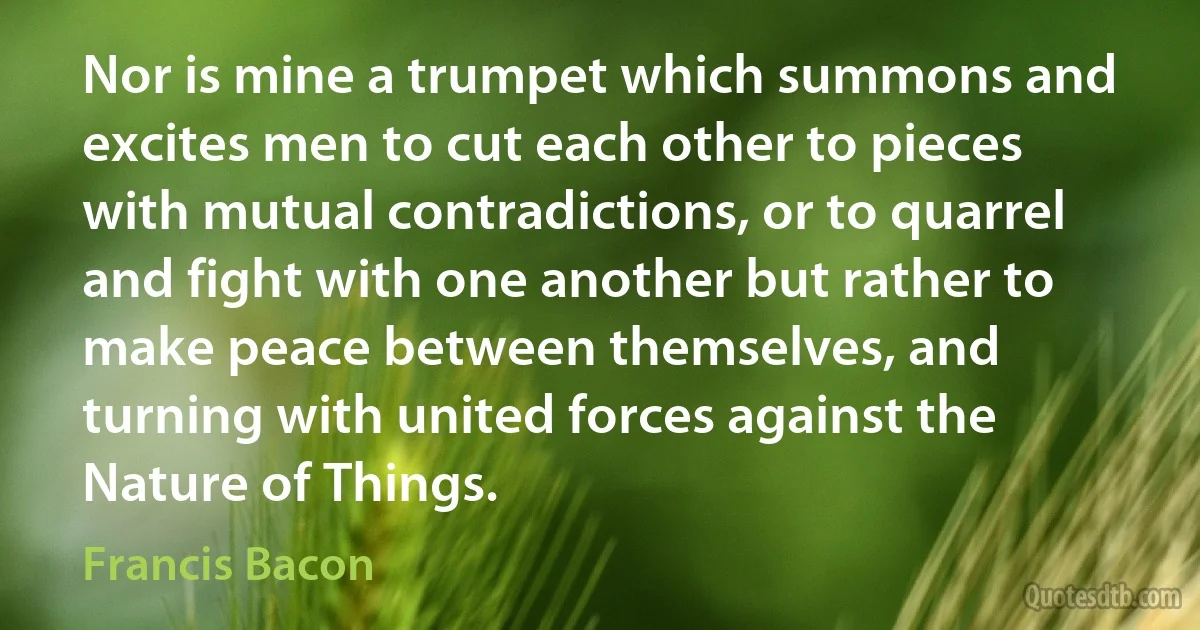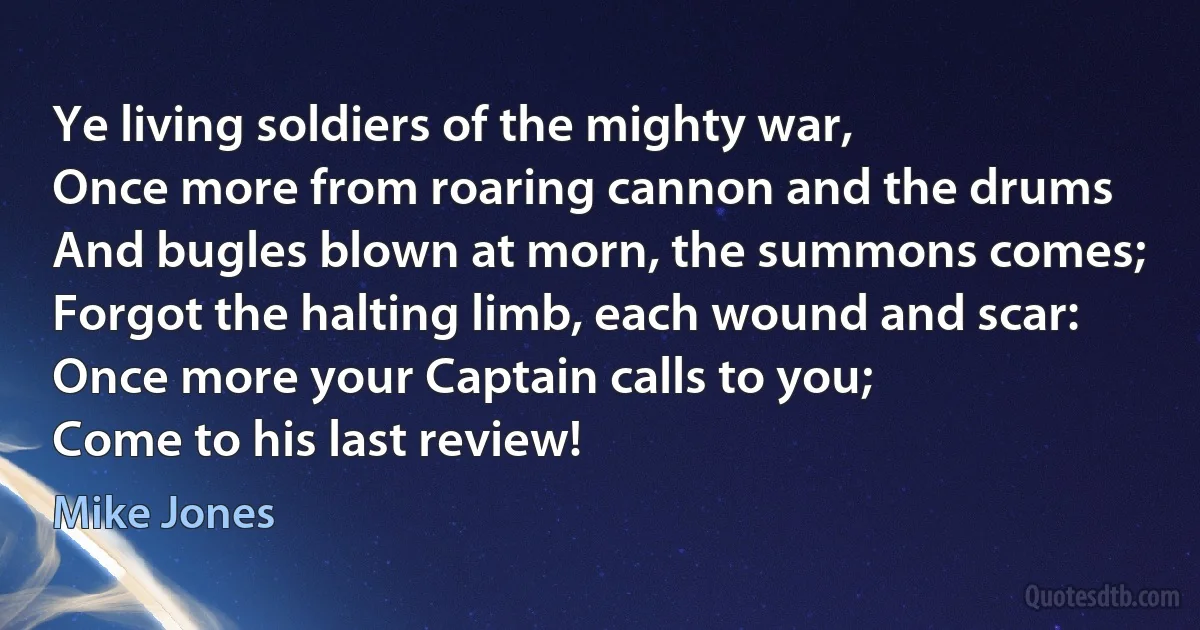Summons Quotes - page 3
There is yet one place of shelter,
Where the foeman cannot come,
Where the summons never sounded
Of the trumpet or the drum.
There again we'll meet our children,
Who, on Flodden's trampled sod,
For their king and for their country
Rendered up their souls to God.
There shall we find rest and refuge,
With our dear departed brave;
And the ashes of the city
Be our universal grave!

W. E. Aytoun
In the domain of Political Economy, free scientific inquiry meets not merely the same enemies as in all other domains. The peculiar nature of the material it deals with, summons as foes into the field of battle the most violent, mean and malignant passions of the human breast, the Furies of private interest.

Karl Marx
How shocking must thy summons be, O Death!
To him that is at ease in his possessions!
Who, counting on long years of pleasure here,
Is quite unfurnished for the world to come.
In that dread moment, how the frantic soul
Raves round the walls of her clay tenement;
Runs to each avenue, and shrieks for help;
But shrieks in vain.

Hugh Blair
To adore, to understand, to receive, to feel, to give, to act: there is my law my duty, my happiness, my heaven. Let come what come will - even death. Only be at peace with self, live in the presence of God, in communion with Him, and leave the guidance of existence to those universal powers against whom thou canst do nothing! If death gives me time, so much the better. If its summons is near, so much the better still; if a half-death overtake me, still so much the better, for so the path of success is closed to me only that I may find opening before me the path of heroism, of moral greatness and resignation. Every life has its potentiality of greatness, and as it is impossible to be outside God, the best is consciously to dwell in Him.

Henri-Frédéric Amiel
I would count him blessed and holy to whom such rapture has been vouchsafed in this mortal life, for even an instant to lose thyself,
as if thou wert emptied and lost and swallowed up in God, is no human love; it is celestial.
But if sometimes a poor mortal feels that heavenly joy for a rapturous moment, then this wretched life envies his happiness,
the malice of daily trifles disturbs him, this body of death weighs him down, the needs of the flesh are imperative,
the weakness of corruption fails him, and above all brotherly love calls him back to duty.
Alas! that voice summons him to re-enter his own round of existence; and he must ever cry out lamentably,
‘O Lord, I am oppressed: undertake for me' (Isa. 38.14); and again, ‘O wretched man that I am! who shall deliver me from the body of this death?' (Rom. 7.24)

Bernard of Clairvaux
Of course, the trouble with following occult texts blindly is that there is no guarantee that the thing the ritual summons is what it says on the label.”
"But they're Christians. If you want to get them to raise something from the dungeon dimensions, of course you tell them it's Jesus Christ. I mean, who else would they enthusiastically dive into necromantic demonology on behalf of?

Charles Stross
How strong were the feelings surging in my heart may be seen in a brief extract from an article published second week of January, 1885: "Christian charity? We know its work. It gives a hundred-weight of coal and five pounds of beef once a year to a family whose head could earn a hundred such doles if Christian justice allowed him fair wage for the work he performs. It plunders the workers of the wealth they make, and then flings back at them a thousandth part of their own product as 'charity.' It builds hospitals for the poor whom it has poisoned in filthy courts and alleys, and workhouses for the worn-out creatures from whom it has wrung every energy, every hope, every joy. Miss Cobbe summons us to admire Christian civilisation, and we see idlers flaunting in the robes woven by the toilers, a glittering tinselled super-structure founded on the tears, the strugglings, the grey, hopeless misery of the poor." Chapter XIII Socialism.

Annie Besant
This is the reason for the clear and unsparing summons to fight Bolshevism and international Jewry, whose race-destroying activities we have sufficiently experienced on our own people. Therefore, the alliance with all similar-minded Nations who, like Germany, are not willing to allow their strength, dedicated to construction and peaceful work at home, to be disrupted by alien ideologies as by parasites of a foreign race.

Erich Raeder
The standard bearers have grown weak in the defense of their priceless heritage, and the powers of darkness have been strengthened thereby. Weakness of attitude becomes weakness of character; it becomes lack of power to act with courage proportionate to danger. All this must lead to the destruction of our intellectual life unless the danger summons up strong personalities able to fill the lukewarm and discouraged with new strength and resolution.

Albert Einstein


